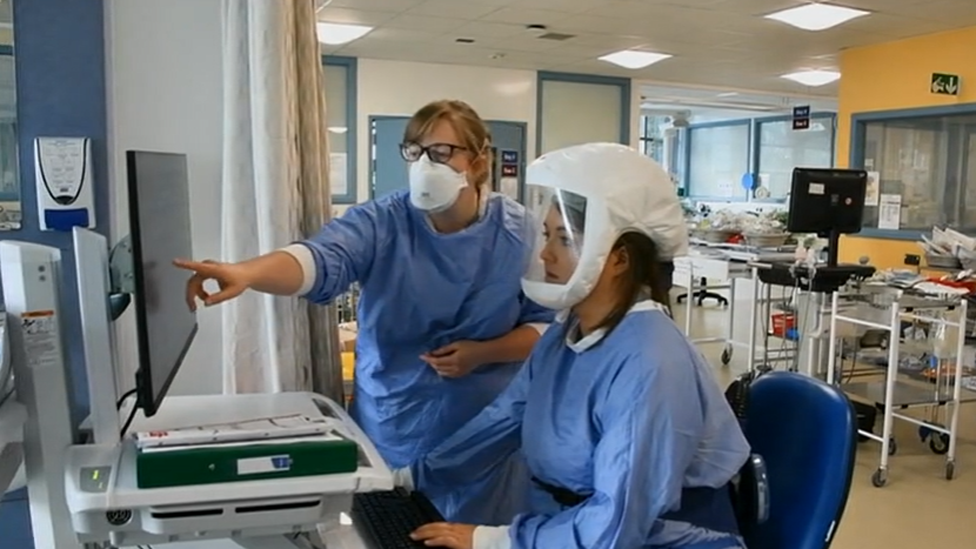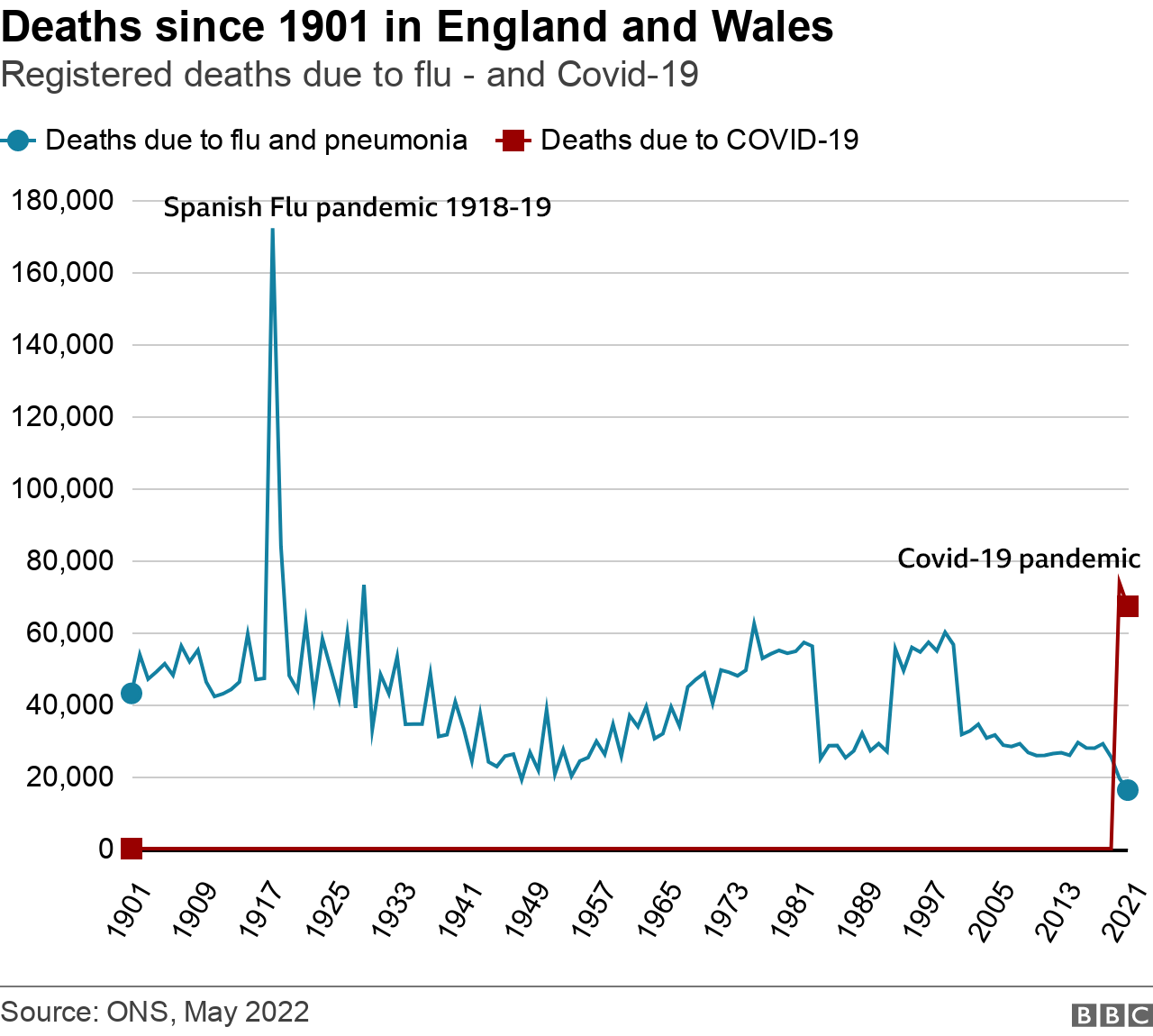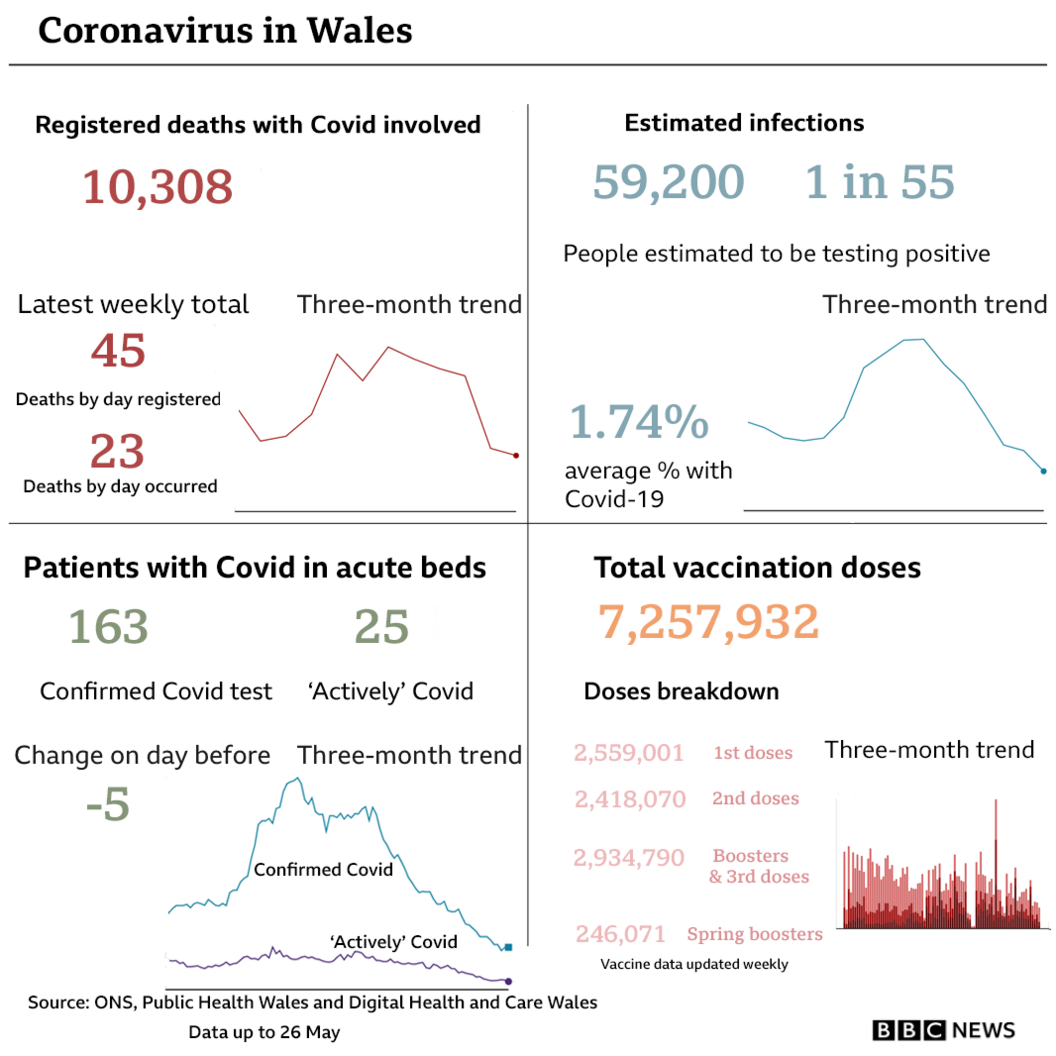Covid: Is the pandemic finally over in Wales?
- Published

Hospitals in Wales have seen a 27% drop in patients testing positive for Covid in the last week
The Welsh government has announced the end to all Covid restrictions on Monday, a milestone marking the end of the emergency response to the pandemic.
And for the sixth week running, Covid-19 infections have fallen in Wales.
The best estimate is that 52,900 people had Covid, the lowest figure since last September. Meanwhile, only about 25 patients across Wales were primarily being treated for Covid in hospital.
But does this mean the end of Covid as a pandemic?
Is the pandemic over?


"Living with Covid" and being watchful for the emergence of any harmful variant in the future is the public health position going forward.
The numbers show infections have now dipped to the lowest level for eight months, with more than 98% of the population unaffected in the last week.
The difference now is that Omicron, being milder, and with more people having vaccines or building up immunity from having Covid already, means fewer, sicker patients in hospital.


Infection is still out there and considerable numbers of people coming into hospital for other treatments still test positive for Covid.
But very few patients now are actually being "actively" treated for Covid itself and those numbers - and those testing positive for Covid when admitted - have been falling.
Health officials believe it is unlikely that even the emergence of sub-variants of Omicron in recent weeks will lead to significant direct Covid pressures in the immediate future.
Is Covid endemic?
The official line is that the pandemic is not over but that the current public health situation is consistent with the "Covid-stable" scenario., external
Covid will only be considered "endemic" when its patterns are more predictable, such as well established seasonal winter waves, but this could take a while yet.
Health officials need to study in more detail how Covid behaves - and the effectiveness of vaccines against any future variants - before it can be treated in the same way as flu.
Dr Fu-Meng Khaw, national director of health protection and screening services at Public Health Wales, said his working definition, which applies to flu, was when a virus was at a "low, acceptable and predictable rate."
"We're not quite at that stage with Covid, yet. For a new virus it could take two, three, four or even five years to be able to understand the pattern and how it will pan out."


There have been around 630 deaths due to Covid-19 in Wales in 2022 up to the end of April.
Latest advice from Welsh government scientists projects a decline in NHS pressures and Covid deaths over the next several weeks.
Looking at the bigger picture, the Office for National Statistics (ONS) says across England and Wales, deaths due to Covid have been annually higher since the pandemic began than flu and pneumonia deaths in any year since 1929, when there were 73,212 deaths.
It adds that it is too early to know whether a seasonal pattern will emerge for Covid deaths in a similar way to flu and pneumonia.
Survey in Wales, early May 2022
37%Try to keep 2m from people when out
49%Wear a face covering
23%Take a lateral flow test before meeting family or friends or attending an event
16%Only leave home for essential trips
Are people behaving differently?
Dr Simon Williams, who has studied Covid behaviours and public attitudes during the pandemic at Swansea University, said there still appeared to be some caution although most people were moving on from the pandemic.
"Recent data suggests that in Wales, more than one-in-three in Wales are still socially distancing, external, about one-in-six report still only leaving the house for essential trips, and nearly half report wearing facemasks - although this might have dropped further in the past few weeks," he said.
"One-in-five still feel that they are at very high or high risk from Covid."
Dr Williams added: "The challenge from the behaviour side of things is to embrace and enjoy life freely and for making up for the hard two years of the pandemic, but not completely throwing the baby out with the bath water."
He said people needed to enjoy social and physical contact for their mental wellbeing but remember, if they need to, to take some reasonable steps to ensure Covid does not spread excessively.
"If there was a new variant, or if, come the winter, cases did start to rise quite quickly, we might consider wearing a mask in crowded spaces or trying to stay at home if we have some symptoms to reduce the spread."
He said government and employers needed to support staff to work from home or have appropriate sick leave if necessary.


'Ready to scale up'
First Minister Mark Drakeford said they would remain alert to the threat of new and emerging variants, and would be "ready to respond" if they saw a rapid spread of the virus, causing widespread harm.
He set out ways the public could remain safe, while the Welsh government was "ready to scale up" if required.
The recommendations include strongly advising, if not now demanding, that people wear a face mask in health settings - and also to think of face coverings in crowded indoor places.
Mr Drakeford added: "Continuing to take simple steps, including staying up to date with vaccinations; self-isolating if you have Covid-19 symptoms and maintaining good hand hygiene, will be important in helping us all to enjoy a safer and brighter future together."
This is echoed by Dr Khaw at Public Health Wales (PHW), who said people should enjoy full lives again but take "sensible precautions," especially when meeting more vulnerable people.
PHW is setting up its own surveillance network to keep track of the emergence of any new variant of concern.
The Covid aftermath
The health service meanwhile is dealing with the waiting list backlog and bed occupancy in acute hospitals - the rate in which wards are full - is at record high levels.
As well as these pressures, there is the added burden from people still feeling the long term effects, both on their mental health and so-called "long Covid".


More people in Wales are reporting symptoms of "long Covid" - with 85,000 saying they are experiencing the long-term effect of having the virus.
This is the highest number reported since figures were collated by ONS.
In the latest figures, 33,000 people in Wales were still reporting symptoms more than a year since having Covid.
Dr Williams, at Swansea University, said the pandemic had widened inequalities, with more people on low income and zero-hours or insecure contracts because of the pandemic, and the pandemic having disproportionately harmed people from ethnic communities.
This is a reminder that while Covid is no longer a major issue in people's everyday lives, for some it has not gone away.
Dr Williams added: "So even when the pandemic is over - however we define it - the impacts of the pandemic and the policies designed to control it, are far from over.
"There is a lot of work to be done to try and restore people's mental and social wellbeing, and narrow some of these inequalities."
- Published28 May 2024

- Published27 May 2022
